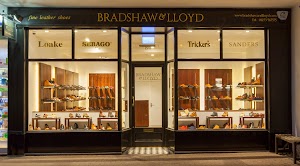Brogues, often known as wingtips in the United States, are low-heeled shoes made of heavy leather, originating in Scotland and Ireland as a coarse, usually untanned leather shoe. The term wingtip derives from the toe cap pattern, which forms a W and resembles the profile of spreading bird wings.[1]
Brogues proper are traditional men’s country shoes, less formal than even brogued Oxford shoes, or shoes with less than full broguing. As outdoor shoes, they are normally made in brown and are not traditionally worn in town (though the more formal Oxford laced shoe is commonly made in black even when fully brogued, and is now worn in town).
Full brogues (also known as wingtips) have a toe cap in a W shape, with punched patterns on various sections of the shoe, such as the heel counter. Half brogues have a normal straight-edged toe cap and less punching. Terms such as quarter-brogue and so on may be used to describe progressively less brogueing. The terms full brogue and half brogue do not necessarily refer to brogues in the traditional sense, but instead to the degree of broguing on the shoe, allowing, for example, full brogue shoes with closed (not open) lacing.
An extensive range of brogues, both as an Oxford cut and Derby cut are available from: Loake shoes, Sebago shoes, Sanders shoes, Trickers shoes and Bradshaw and Lloyd shoes. Visit www.bradshawandlloyd.com to view the full collections.
Ghillie Brogues are a type of shoe with laces along the instep and no tongue. Although now primarily worn for social events, Ghillies originated as a shoe that would drain water and dry quickly due to the lack of a tongue, and not get stuck in the mud because the laces were above the ankle. Loake’s ‘Ghillie’ shoe is a prime example of this style.
The word brogue is derived from the Scottish and Irish Gaelic word bróg, meaning shoe; the plural is brògan (Scots Gaelic) or “bróga” (Irish). The term brogue survived in American English as the term Brogans in Appalachian and southern United States dialects. The word ghillie comes from gille (Scots Gaelic) (Ir. giolla) meaning a “lad” or a “servant”.


